61% of customer service professionals say reps will use AI/automation by 2024. But is AI right for your business model, and if so, how can you leverage its potential?

To help you decide, showing you how this tech fits into the customer service landscape — with case studies to back it up. We also highlight the pros and cons of AI in customer service, plus recommended tools.
P.S. Expect juicy data from the State of AI Report, alongside real insights from people using AI within their customer service processes.
Table of Contents
- How Teams Use AI for Customer Service
- The Advantages of AI in Customer Service
- The Limitations of AI in Customer Service
- AI Tools to Power Your Customer Service Strategy
How Teams Use AI for Customer Service
According to data and expert insights, here are four ways teams leverage AI in their customer service processes.
Routing Requests to Reps
The State of AI Report cites routing requests to reps as the most popular customer service use case for AI/automation. For context, 29% of experts surveyed mentioned this as their preferred use case.
How It Works
AI will first analyze the customer query or ticket to route quests to service reps.
It's looking for information (like trace keywords) to identify the nature of the request. Keywords could be anything related to common customer issues (think "refund" or "delivery delay").
If you've trained your AI tool to answer the query, and it can, it will. If not, the AI will forward the customer query or ticket to the most relevant rep.
Routing In Action
"There are many queries that a chatbot can handle with ease. It can also offer quick solutions to common issues," says CEO of Specialty Metals Dan Fried.
Fried mentions customers wanting to know "standard information about metals or our services" as common queries AI handles for Specialty Metals. Stating the AI "will give all the required details in a few seconds."
But if it's a complicated query, "the chatbot can transfer the interaction to an executive. Hence, there won't be a waste of time for the customers."
Vinnie Schneider, director of brand strategy and lead generation at Dovetail, echoes this.
"When it comes to AI, something like an AI chatbot can be useful as a first touch with customers to help direct them to an actual human more quickly," says Schneider.
Vinnie mentions common transactional questions like "Where do I pay my bill?" or "How do I cancel my account?" as examples of where AI can excel.
But the AI still needs to recognize "keywords or phrases to help route the chat to a live operator." Because sometimes an "empathetic, human touch is needed."
Collecting and Analyzing Customer Feedback
Of customer service experts, 28% use AI to collect and analyze customer feedback. This makes it the second most popular use for AI/automation in customer service, according to the State of AI Report.
How It Works
Collecting customer feedback and looking for patterns don't just help you improve your customer service delivery. It can also help you improve your service and product offering in general. Both of which can make customers happier.
Gathering data from online surveys, social media platforms, customer support interactions, and product reviews takes time. But an AI tool will quickly collect, organize, and analyze large amounts of structured data like this.
AI can also use Natural Language Processing (NLP) techniques to gather information from unstructured data sources like audio and video.
Unstructured data takes longer to collate and analyze manually than structured data (i.e., online surveys).
Enabling Chatbots or Self-Service Tools to Answer Customer Questions
The third most popular use for service AI/automation is enabling chatbots or self-service tools to answer customer questions. 26% of service experts surveyed for the State of AI Report chose this as their primary use case.
How It Works
Creating a solid knowledge hub or Frequently Asked Questions (FAQ) page can take time. But to create good CX, these self-service resources are essential.
As a priority, they make it easier for your customers to access the information they need. As a bonus, you can use your existing resources as a knowledge base to train AI chatbots and self-service tools.
You can integrate these tools with a knowledge base with information about products, services, policies, FAQs, and troubleshooting guides. AI algorithms will then use the knowledge base to answer real-time customer queries.
Q&A in Action
Laural Mill owner Nick Giulioni shares how they use AI to answer questions for potential couples using their wedding business.
"Right now, we have a service called CustomGPT that's able to answer many/most of the questions people have," says Giulioni.
They introduced the tool to save customers from searching "for an FAQ or date selector to answer their questions" and provide a better experience.
From a business standpoint, "If one of our 'agents' is able to quickly qualify/disqualify customers, that means our sales staff can reduce their number of interactions that have zero percent chance of converting," says Giulioni.
Training Agents
An emerging way to use AI is as a training tool for your customer service agents. AI can help you in a few ways, including sentiment analysis, knowledge base integration, and performance analytics.
How It Works
AI algorithms can analyze customer conversations, emails, or support tickets specifically for customer sentiment.
Your agents can then use AI's sentiment analysis to gauge the emotional context of customer interactions. This data can help inform their responses, such as deescalating tense situations.
Knowledge base integration means you can turn your AI into a training bank. The AI tools can give real-time suggestions and recommendations to customer service agents. That can be useful when onboarding new customer service agents.
Similar to how AI can analyze customer feedback, it can also track and analyze the performance of customer service agents. You can use performance analytics to highlight what's working well and any areas for improvement.
Training in Action
"This might be unconventional, but we use AI aids to train our agents by getting them to roleplay different customer service scenarios," says CEO of CabinetSelect Chris Alexakis.
"This helps them to practice and hone their problem-solving and interpersonal skills in a controlled environment. We can also track their progress more easily based on the AI aids' records," Alexakis says.
Chris highly suggests other businesses "use emerging tech creatively too."
The Advantages of AI in Customer Service
From 24/7 customer to multilingual support, we highlight seven key advantages of using AI in customer service.
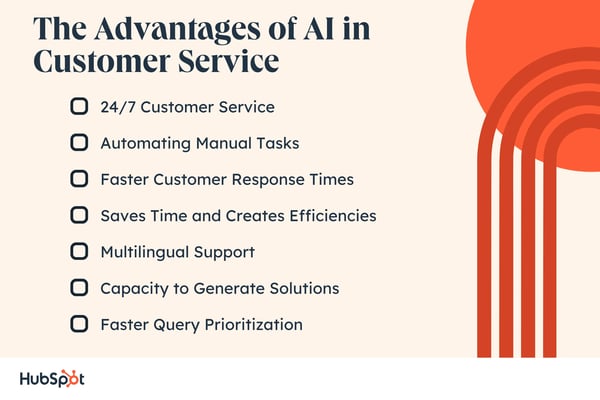
24/7 Customer Service
The State of AI 2023 Report found 24/7 customer service to be the most popular benefit of using AI/automation tools. 36% of customer service experts chose this as the most significant benefit of using this tech.
Adopting an AI system (i.e., chatbots and self-service resources) gives your business the means to handle routine queries around the clock. 24/7 AI support helps your customers get support much quicker.
It also frees your human team to focus on more complex issues.
Plus, AI can support an omnichannel service experience by directing customers to the right support channels anytime.
Advantage in Action
Jas Banwait Gill, the growth manager at SwagMagic, shares how their global platform powers 24/7 customer service through AI.
"ChatGPT bots power 24/7 connections with new and existing customers on our social media channels." As soon as people arrive on the page, "they can opt to initiate a conversation by messaging our chatbot to indicate their needs," says Gill.
"The chatbot addresses queries using simple prompts. Each response guides the bot in finding the best solution, which can be through our social channels, website, or service agent," Gill says.
"It's a customer-first approach to creating a personalized and seamless experience between our social channels and ecommerce websites."
Automating Manual Tasks
Automating manual tasks was the second biggest benefit of using AI in customer service. In fact, 31% of the State of AI Report respondents chose this as their favorite advantage.
Expert Insights
According to Head of Customer Support at Koinly Hannah Nordlund, using AI to automate manual tasks can make everyday work life in customer support more interesting.
"It reduces mundane tasks, opening up more meaningful conversations with our customers and allowing us to dive deeper into troubleshooting, providing more tailored assistance," says Nordlund.
Faster Customer Response Times
Creating faster customer times was the third biggest advantage of AI/automation for customer service.
The State of AI Report also found that 84% of customer service reps using AI say, "It makes it easier for them to respond to tickets."
Pro tip: Faster response times can reduce friction across the customer journey.
Advantage in Action
Maya Gupta, Owner of Hoefnagel Wooden Jigsaw Puzzles Club, spoke about their experience using AI in customer service.
"We rent jigsaw puzzles, and about a year ago, created an AI to handle customer problems about puzzles and shipments, from 'the puzzle never arrived' to 'my dog chewed a piece,'" says Gupta.
The main benefit is "that customers now get instant decisions about how we're going to handle their problem."
But as a bonus, she finds the AI "is more consistent in its decisions." It can also "handle more complexity," taking into account "details of the puzzle, the puzzle condition, and the customer history," Gupta notes.
Saves Time and Creates Efficiencies
AI's ability to automate manual tasks and help with basic customer queries can be massive time savers for your customer service team. AI can also gather and interpret large volumes of data far quicker than humans.
For example, using AI to leverage large amounts of data and identify trends is much quicker. You can gain insights (about customer satisfaction levels or recurring issues, for example) at speed.
This saves your human team from spending hours doing this manually.
Advantage in Action
Zack Hughes, founder at thezackhughes.com and director of SOF coaches at Apex Entourage, shared with us how he automates tasks with AI. Hughes says he uses AI, especially in the scripting process.
"AI has some serious benefits. It's like a data crunching machine, spotting trends and helping us refine our scripts to better meet customer needs, and it's a lot faster. Tasks that would take us hours, AI can do in a snap," says Hughes.
Multilingual Support
Most AI chatbots and conversational tools can create and interpret text in multiple languages. For global businesses, this can be game-changing.
Depending on the tool, AI can detect a customer's language and provide your support team with a translated version of any queries.
You can also train your AI to translate text from your knowledge hub. Then use the text to respond to customer questions in their language.
This integration in your business can help you better communicate and understand customer requests, needs, and complaints.
Advantage in Action
Luke Lovelady, who runs lukelovelady.com, has been using AI for multilingual support.
Lovelady runs an online trading service through social media, helping people trade the financial markets. Of his clients and followers, Lovelady says 77% are internationally based, which makes for complicated language barriers.
"I have incorporated AI chatbots and conversational tools to help translate messages I receive through my email management platforms," says Lovelady.
When someone emails, the AI tools provide "a translated version of the text as long as the user agrees to the conditions required."
Capacity to Generate Solutions
A "limited memory AI" tool can capture previous data and use it to give recommendations for future customer actions.
The AI bases recommendations on your customer's activity. Meaning your customers receive solutions with minimal human intervention.
Advantage in Action
"From our experience, the greatest advantage of AI is its capacity to generate solutions on the fly," says Tech Lead at Longhouse Media Austin Mallar.
"We had a situation where a client wanted a particular webpage that displayed sensitive information on their WordPress site to be limited to certain users."
According to Mallar, "ChatGPT was able to generate a solution that worked perfectly, substantially cutting down the time we would have otherwise spent having to quote the client a price to solve the problem, and ultimately doing the work to create the solution."
Faster Query Prioritization
One of the biggest challenges for customer support is prioritizing large volumes of inquiries and requests.
That process can be time consuming and lead to customer agents constantly having their hands full. That prevents your team from handling the most urgent tasks first.
Using AI to help prioritize queries can streamline your workflows. Meaning you can maximize your customer service interactions.
Advantage in Action
Appareify Co-founder Nora Salama shared how this process works for their company.
"We recently started to utilize generative AI tools that can analyze CX requests based on sentiment, intent, and language before appropriately categorizing tickets," says Salama.
Doing so has helped Appareify "prioritize tickets, send tailored responses, and even more easily assign them to the agent that is most qualified to address the issue with speed and efficiency," says Nora.
Nora says their CX agents can "now quickly deal with any dissatisfied customers first." This has helped them "dramatically improve the customer experience" and "significantly reduce the risk of churning."
The Limitations of AI in Customer Service
Despite its many advantages, there's no escaping it: AI has its fair share of disadvantages too. And those disadvantages may present varying degrees of risk to your business. Let's investigate further.
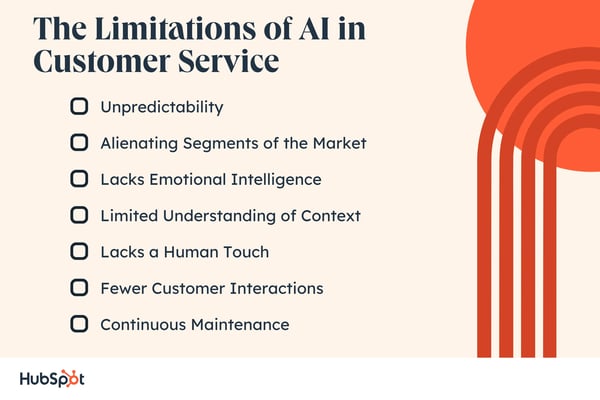
It can be unpredictable.
While AI itself isn't exactly new, the sheer level of availability of this tech to humans is. We're still testing and tinkering to see what this tech can do. As such, AI tools can be unpredictable and, in some situations, potentially dangerous.
Expert Insight
Badger Chat Co-founder Mark Woodward spoke to this.
"It's easy to forget that ChatGPT doesn't actually understand humans or social norms or even language. It's merely reciting patterns in text it's seen before and told are good," says Mark.
He emphasizes, "There are situations that need to be handled with a sensitivity that comes from an understanding that we gain from life experience and social conditioning." And that level of nuance isn't always "possible to infer from text."
It may alienate segments of the market.
By adopting a full AI approach to your customer service processes, you may risk alienating different parts of your customer base.
That could be those with growing security concerns about how AI uses their personal data. You might also exclude elderly individuals who don't feel comfortable using this technology.
Disadvantage in Action
Marc Ray from Domotics101 shared their insights on this issue. Domotics101 is a service provider catering to older Americans with smart home products.
He acknowledges "the significant benefits" of this tech, specifically for "providing quick responses and guiding users through troubleshooting steps."
"However, it is crucial to acknowledge the limitations and potential cons of relying solely on AI for customer service," says Ray.
For example, "Some elderly individuals may feel uncomfortable or unfamiliar interacting with AI-powered systems, preferring human interaction and reassurance."
AI lacks emotional intelligence and empathy.
In stressful conversations or interactions, customers may seek the human touch.
More specifically, emotional intelligence and empathy. These human abilities allow customers to feel valued and heard rather than disgruntled by negative interactions.
Expert Insights
"While AI can provide accurate and fast responses, it often lacks the ability to understand and empathize with customer emotions," says Director at Cyphere Harman Singh.
Singh has implemented AI into their customer service processes and recommends that complex or emotionally charged issues "may require human intervention."
In these instances, humans can provide "a more personalized and compassionate customer service experience."
There's a limited understanding of context.
AI can automate and segment tickets based on the nature of the queries. It can even go as far as identifying customer sentiment based on the tone of voice.
Heck, it can even use the data to follow up with basic account actions.
But AI may struggle with more challenging issues like high cancellation intent, high frustration, and other grievances.
Simply put, aside from lacking the emotional intelligence to handle complex issues, AI needs help understanding the wider context. Thus its customer recommendations can lack nuance.
Disadvantage in Action
Tom Farmer, founder of Solo Innovator, has benefitted from AI's advantages, like increased efficiency of customer service operations. But, one notable limitation "was the chatbot's struggle with difficult or specific queries."
"The AI was not able to directly fix any data issues with our application or provide any low-level support, meaning that it was only useful for basic initial queries," says Farmer.
"Although our chatbot could provide quick and accurate responses, it may not have been able to deliver the same level of personalized interaction that a human customer service representative could provide."
AI lacks the human touch.
Integrating AI into your customer service processes can bring incredible advantages. But there's one thing everyone who shared their insights about AI in customer service mentioned.
The human touch is irreplaceable.
What's more, your customers can feel when it's missing, leading to frustration and increasing the chances of churn.
Expert Insights
"We strive for balance, using AI for efficiency and human interaction for personalization which can be hard to do," says Alexakis.
Alexakis emphasizes that "we've learned to ask our customers what they prefer and help them accordingly. In case of routine queries, we use AI, but in case of detailed queries or complaints, we ensure to use a human CS Rep."
Hughes mirrors this point. "Sometimes, AI can feel a little too, well, artificial. It misses that human touch, and we've noticed customers can pick up on that."
There are fewer interactions with customers.
Using AI in your customer service can reduce the need for human agents to intervene with issues.
The upside? It saves time and allows your reps to focus on more complex tasks.
The downside? Your team will have fewer interactions with customers.
That means fewer chances to organically gather critical feedback and make your customers feel valued.
Disadvantage in Action
Justin Silverman, founder and CEO at Merchynt, says their "company uses AI now for every step of our customer journey."
That has meant the ability to "provide our customers with a near-instant personalized strategy plan based on information we gather during their sign-up process," says Silverman.
Overall, AI has improved customer satisfaction. The trade-off is "fewer interactions with our customers."
Meaning, "we are missing valuable opportunities to gather feedback on how we can continue to improve our offerings," mentions Justin.
AI needs continuous maintenance updates.
AI systems rely on data algorithms, and if these algorithms are not adequately trained or updated, there is a risk of providing incorrect or misleading information.
Because of that, regular monitoring and maintenance of AI systems are crucial to minimize the occurrence of errors.
Disadvantage in Action
Salama of Appareify has experienced this first-hand.
"The only downside is that these systems require continuous monitoring and updates." The knock-on effect "means having to pay more in costs by hiring specialists to ensure consistent and optimal performance," says Salama.
AI Tools to Power Your Customer Service Strategy
Now that you know the advantages and disadvantages of using AI in customer service, let's look at some tools. For every tool recommendation, we provide core features, what we love about it, and pricing so you can make an informed choice.
HubSpot's Content Assistant
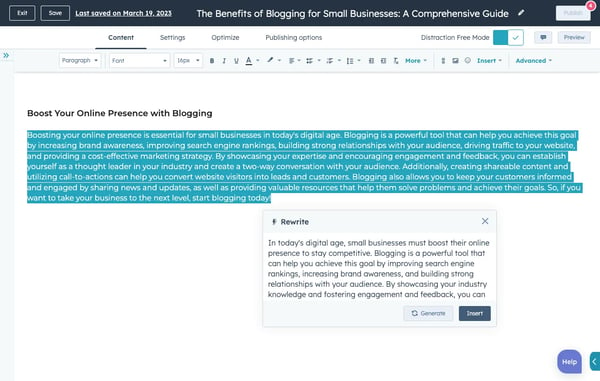
HubSpot's AI content assistant can help you create a bank of knowledge base articles for your existing customers. You can then use that knowledge base to train AI, further freeing up your team and streamlining internal workflows.
You can also use HubSpot's AI tool to craft personalized customer support emails.
Core Features
- Integration with existing HubSpot products
- Craft customer service emails
- Get blog ideas for your self-service resources
- AI-written articles and outlines
What we love: You can use HubSpot's Free AI Blog Writer to reduce research time and generate articles. The feel tool will help you build your self-service knowledge hub without draining your time and resources.
Price: Get started for free.
Zendesk

Zendesk offers a complete customer service solution. Zendesk's API helps your agents to personalize conversations by providing customer insights.
The AI integration also makes it easy for your team to anticipate future requests and provide solutions before issues arise.
Core Features
- Ticketing system
- Email, chat, voice, social messaging
- A help center
What we love: The chatbots offered by Zendesk are accessible at any time of the day or night. They can give your customers solutions to basic concerns or give self-service resources (like articles) from your help center.
Price: Plans start at $55 per month.
SupportGPT™
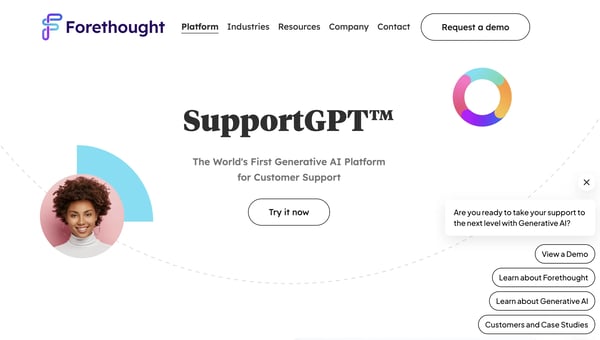
SupportGPT™ from Forethought.ai is the world's first generative AI platform specifically for customer support.
The product's at the forefront of AI, leveraging Large Language Models and tweaking them based on your customers' conversation history.
Core Features
- A complete platform for the entire customer service lifecycle
- Human-like conversations
- Automated workflow discovery
- Complete agent responses
- Gap analysis and content generation
What we love: SupportGPT™ is leveling up traditional chatbots and showing what's possible for the future of generative AI in customer support. Their playground feature also lets you build your own bot for free.
Price: Pricing plans depend on how many tickets you receive and the number of agents using Forethought's AI.
Caffeinated CX
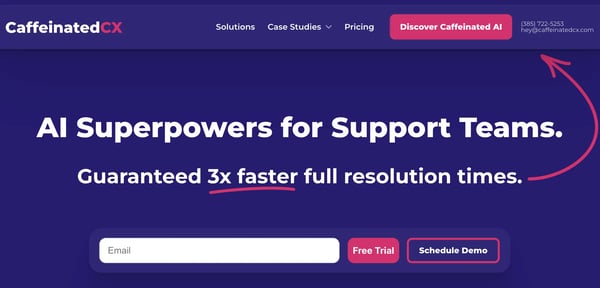
Caffeinated CX uses AI to help your customer support team solve tickets quickly. Caffeinated can answer 39% of inquiries itself. It can also help you better understand customer sentiment and overall satisfaction.
Core Features
- Sentiment analysis
- Response automation
- Data and insights
What we love: The platform provides data and insights based on customer interactions. It does so across multiple channels (email, Chat, Facebook, and Instagram messages). The insights will give you a better understanding of customer preferences and needs.
Price: Plans start at $299 monthly for 2,000 tickets when paid at an annual rate.
TheLoops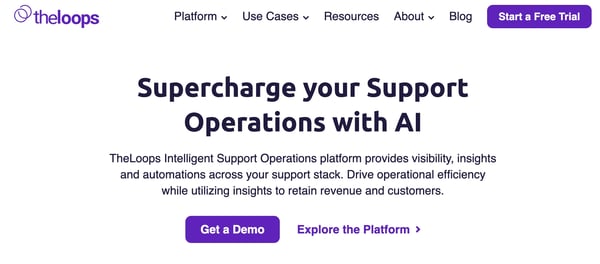
TheLoops is a customer support operations platform. Through customer data and product signals, the tool makes it easier for you to understand what's happening outside your support tools.
TheLoops "Escalation Prediction" can help you identify higher-priority tickets before escalation occurs.
Core Features
- A library of no-code integrations
- Data connectors (CRM, CSM, and engineering)
- AI-driven insights (auto-prioritization using Sentiment and Scoring)
- Operational analytics
What we love: TheLoops is a low-code solution to help you streamline your support workflows through automation.
Price: Pricing is available upon request.
LetsAsk.AI
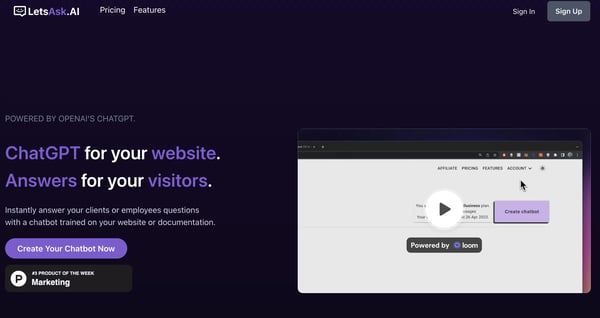
LetsAsk.AI helps you build a chatbot using your website or documentation as training material. You can use the tool to help answer typical customer and employee queries.
Once you've built your chatbot, you'll get an embed code, making adding it to your website easy.
Core Features
- Create a chatbot with any text, file, or website
- Multilingual
- Simple web integration
What we love: It's free to build your first chatbot. You can use any text, file, or website to do it. Then customize the chatbot, including choosing from 95 different languages.
Price: Basic plans cost $19 per month; pro plans cost $99 per month; business plans cost $499 per month.
Striking the Balance: Harness AI's Potential With the Human Touch
When it comes to AI, two things can be true at once. You might be understandably nervous about how AI could impact your role in customer service. Equally, the tech can't uninvent itself, meaning AI is here to stay.
But for all AI's advantages (24/7 customer support, automating mundane tasks, faster response times), it can't replace the human touch.
The trick is combining AI's potential and human expertise to create a great CX. One that has customers not just returning but referring your product/service to their network.
![→ Download Now: The State of Customer Service [Free Report]](https://no-cache.hubspot.com/cta/default/53/9c545446-aacf-47a3-bfb3-1998f78b79c8.png)



![How AI Saves Time in Service & Where to Use Extra Hours [New Data]](https://blog.hubspot.com/hubfs/customer-service-ai-2.webp)

.png)
.png)

![Memorable Examples of AR in Customer Experience [+Tips for Implementing the Technology]](https://blog.hubspot.com/hubfs/augmented reality customer experience.png)
.jpg)
